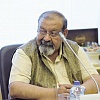Indian Prime Minister Narendra Modi’s visit to the U.S. and his talks with President Barack Obama are no doubt an important development in fostering bilateral New Delhi-Washington ties, although on the surface it has hardly yielded any tangible results. To begin with, from the very beginning there were hardly any expectations of any breakthrough during the visit, so whatever surfaced, it could be described as the success of the visit.
Indian Prime Minister Narendra Modi’s visit to the U.S. and his talks with President Barack Obama are no doubt an important development in fostering bilateral New Delhi-Washington ties, although on the surface it has hardly yielded any tangible results.
To begin with, from the very beginning there were hardly any expectations of any breakthrough during the visit, so whatever surfaced, it could be described as the success of the visit.
Indian Prime Minister Narendra Modi used his U.S. visit to trump up his triumph in the Parliamentary elections earlier this year by staging an impressive, Bollywood-style rally of 20 thousand members of the Indian diaspora in New York’s Madison Square Garden.
It was a signal to the White House that its decision of revoking Modi’s U.S. travel visa in 2005 over alleged involvement in anti-Muslim riots in his home state of Gujarat was a wrong diplomatic move.
Besides this symbolism, in spite of ‘deep’ engagement with the U.S. there are several indicators, which demonstrate the state of flux in bilateral relations, civilian nuclear cooperation being among them. U.S. President George W. Bush worked hard to convince the leaders of Nuclear Suppliers Group to open doors for civil nuclear commerce with India. However, India’s nuclear liability law has dashed the hopes of making a fast buck by the U.S. nuclear energy giants, where Russia is already successfully implementing Kudankulam NPP project.
The issue remains unresolved and it is a group’s task to look after it. For the Indian side the issue is per unit cost of the generated electricity, neither U.S. nor France have been able to match the low Russian price.
Defence was one of the major issues at White House talks, where it was decided to extend the framework agreement for cooperation. However, no specifics were decided as India wants joint ventures in cutting-edge military technology, like the Russian-Indian BrahMos JV, producing the most potent cruise missile in its class.
The India-U.S. joint statement, which was issued after Prime Minister Narendra Modi met U.S. President Barack Obama in Washington on September 30, 2014 mostly deals with their vision of situation in the world and bilateral aspiration in general words. It evades the issue of Ukraine, where India believes Moscow has a legitimate interest. There is no mention of China either, but they expressed concern about rising tensions over maritime territorial disputes in the region and the need to ensure "freedom of navigation and over flight throughout the region, especially in the South China Sea", which coincides with India’s stand as New Delhi is deepening ties with Hanoi.
In my view, here follow the key achievements of Modi’s visit, showing that in spite of seeking closer economic, defence and technological cooperation with the U.S., India is not going to be its junior partner and will be solely guided by its national interests :
- India is not going to join U.S. war against ISIS, but will focus on anti-terror cooperation in its neighbourhood, which has direct bearing on India;
- New Delhi is not going to join any anti-Russian efforts and U.S. plans to contain China.






